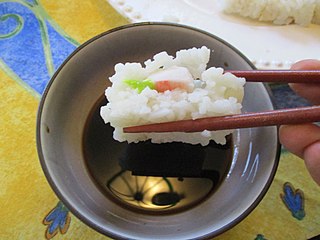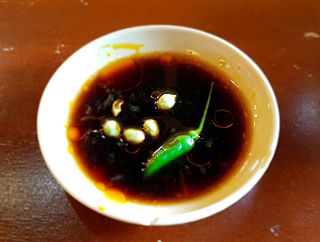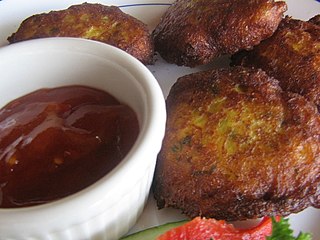Related Research Articles

Tomato sauce can refer to many different sauces made primarily from tomatoes, usually to be served as part of a dish, rather than as a condiment. Tomato sauces are common for meat and vegetables, but they are perhaps best known as bases for sauces for Mexican salsas and Italian pasta dishes. Tomatoes have a rich flavor, high water content, soft flesh which breaks down easily, and the right composition to thicken into a sauce when stewed, without the need for thickeners such as roux or masa. All of these qualities make them ideal for simple and appealing sauces.

A hamburger, or simply a burger, is a dish consisting of fillings—usually a patty of ground meat, typically beef—placed inside a sliced bun or bread roll. The patties are often served with cheese, lettuce, tomato, onion, pickles, bacon or chilis with condiments such as ketchup, mustard, mayonnaise, relish or a "special sauce", often a variation of Thousand Island dressing and are frequently placed on sesame seed buns. A hamburger patty topped with cheese is called a cheeseburger.

In cooking, a sauce is a liquid, cream, or semi-solid food, served on or used in preparing other foods. Most sauces are not normally consumed by themselves; they add flavor, moisture, and visual appeal to a dish. Sauce is a French word probably from the post-classical Latin salsa, derived from the classical salsus 'salted'. Possibly the oldest recorded European sauce is garum, the fish sauce used by the Ancient Romans, while doubanjiang, the Chinese soy bean paste is mentioned in Rites of Zhou in the 3rd century BC.

A chutney is a spread typically associated with cuisines of the Indian subcontinent. Chutneys are made in a wide variety of forms, such as a tomato relish, a ground peanut garnish, yogurt, or curd, cucumber, spicy coconut, spicy onion, or mint dipping sauce.

Salsa encompasses a variety of sauces used as condiments for tacos and other Mexican and Mexican-American foods, and as dips for tortilla chips. They may be raw or cooked, and are generally served at room temperature.

Rémoulade is a cold sauce. Although similar to tartar sauce, it is often more yellowish, sometimes flavored with curry, and often contains chopped pickles or piccalilli. It can also contain horseradish, paprika, anchovies, capers and a host of other items.

A dip or dip sauce is a common condiment for many types of food. Dips are used to add flavor or texture to a food, such as pita bread, dumplings, crackers, chopped raw vegetables, fruits, seafood, cubed pieces of meat and cheese, potato chips, tortilla chips, falafel, and sometimes even whole sandwiches in the case of jus. Unlike other sauces, instead of applying the sauce to the food, the food is typically placed or dipped into the sauce.

The generic term for condiments in the Filipino cuisine is sawsawan. Unlike sauces in other Southeast Asian regions, most sawsawan are not prepared beforehand, but are assembled on the table according to the preferences of the diner.

Chili sauce and chili paste are condiments prepared with chili peppers.

Peanut sauce, satay sauce, bumbu kacang, sambal kacang, or pecel is an Indonesian sauce made from ground roasted or fried peanuts, widely used in Indonesian cuisine and many other dishes throughout the world.

Barbecue sauce is a sauce used as a marinade, basting, condiment, or topping for meat cooked in the barbecue cooking style, including pork, beef, and chicken. It is a ubiquitous condiment in the Southern United States and is used on many other foods as well.

A steak sandwich is a sandwich prepared with steak that has been broiled, fried, grilled, barbecued or seared using steel grates or gridirons, then served on bread or a roll. Steak sandwiches are sometimes served with toppings of cheese, onions, mushrooms, peppers, tomatoes, and in some instances fried eggs, coleslaw, and french fries.

Marinara sauce is a tomato sauce usually made with tomatoes, garlic, herbs, and onions. Variations include capers, olives, spices, and a dash of wine. Widely used in Italian-American cuisine, it is known as alla marinara in Italy, where it is typically made with tomatoes, basil, olive oil, garlic and oregano, but also sometimes olives, capers, and salted anchovies. It is used for spaghetti and vermicelli, but also with meat or fish.

Garlic sauce is a sauce prepared using garlic as a primary ingredient. It is typically a pungent sauce, with the depth of garlic flavor determined by the amount of garlic used. The garlic is typically crushed or finely diced. Simple garlic sauce is composed of garlic and another ingredient to suspend the bulb via emulsion, such as oil, butter or mayonnaise. Various additional ingredients can be used to prepare the sauce.
References
- Gold, Scott (2008). The Shameless Carnivore: A Manifesto for Meat Lovers. Ten Speed Press. ISBN 978-0-7679-2922-6.
- Pienaar, Heilie (2003). Karan Beef Cookbook. Struik. ISBN 978-1-86872-838-1.
- Raichlen, Steven (2010). Planet Barbecue!: 309 Recipes, 60 Countries. Workman Publishing. ISBN 978-0-7611-4801-2.
- Sellick, Will (2010). The Imperial African Cookery Book: Recipes from English-speaking Africa. Jeppestown Press. ISBN 978-0-9553936-8-6.
